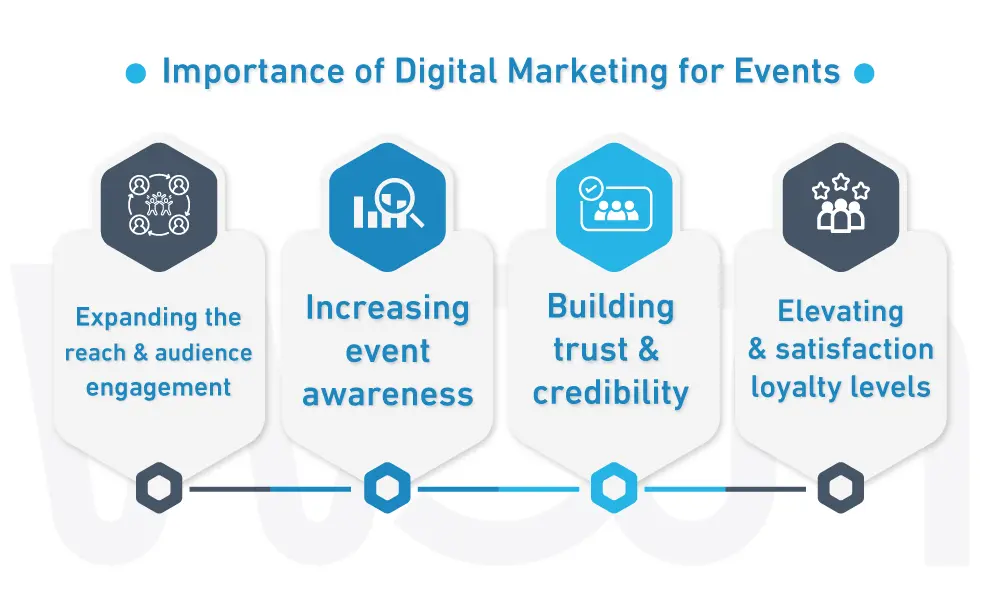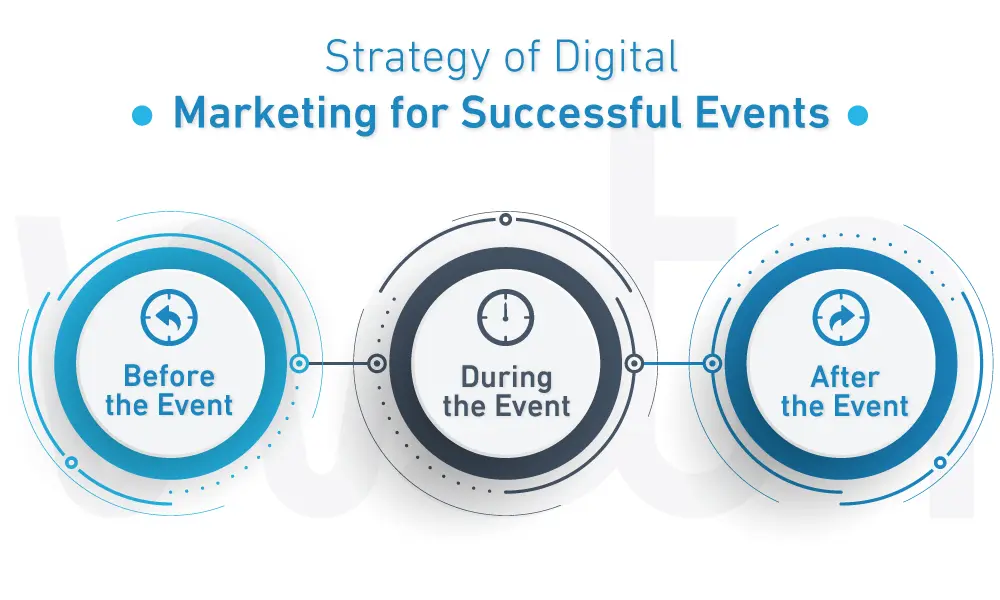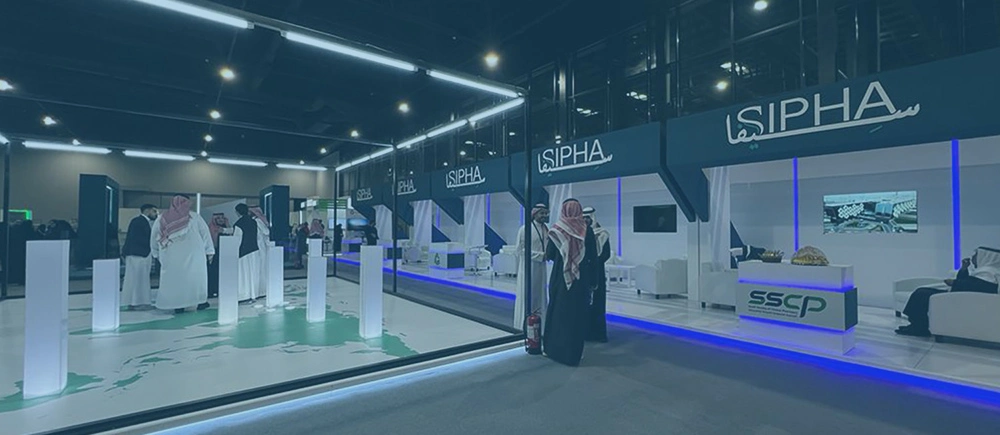Your Vision, Delivered
Say hello to the real experience!
Bring your next event to life—guided by experience, innovation, and excellence.
Let’s create together
Imagine a life without the internet—a prospect that seems incredibly challenging, if not outright impossible. The internet has seamlessly integrated into our daily routines, serving as a vital source for all our informational cravings across various spheres, including the realm of events. A study by Visme highlights a striking fact: 90% of people conduct event searches before attending. This revelation underscores the paramount importance of digital marketing for events, serving as an indispensable tool to captivate and convince the target audience on the vast online platform.
Undeniably, digital marketing for events significantly enriches the attendee experience, and makes it more interactive. In this article, we aim to illuminate the concept of digital marketing, underscore its significance, and delve into the process of identifying the target audience. Furthermore, we will explore the best strategies and tools that can be used to create, promote, and execute a successful online event.
Digital marketing for events is the process of using the internet and social media platforms to attract, engage, and convert potential attendees into participants for a specific event. However, executing this process is far from straightforward or effortless. Marketers must embody creativity and innovation to convey the event's message effectively to the appropriate audience in a unique and influential manner. Moreover, staying well-versed in the latest technologies, tools, and strategies becomes imperative to enhance the efficacy of their marketing campaigns.
Digital marketing is considered crucial and highly important in event management for the following four reasons:

The advantages provided by digital marketing in expanding the reach include the ability to access a broad global audience online, achieve immediate interaction with the audience, and generate measurable and analyzable results. Through these digital channels, you can reach a new audience and build relationships with potential customers.
Digital marketing plays a pivotal role in raising event awareness by offering an effective platform to disseminate information about the event and capture the attention of the intended audience. Engaging and valuable content, such as articles, videos, images, and testimonials, facilitates the dissemination of the event's value and benefits.
The success of any event relies heavily on delivering credible and top-notch experiences. Here, digital marketing steps in to bolster quality and credibility through various means, including providing accurate and transparent information about speakers, sharing the event schedule, showcasing participating partners, and other relevant details that hold significance for the target audience.
Digital marketing serves as a powerful tool to elevate satisfaction and foster loyalty among event attendees. Achieving this objective involves offering added value and showing appreciation to the participants. Numerous marketing strategies can be employed to accomplish this goal.
One effective approach is using rewards and discounts to express gratitude and encourage continued attendance. Offering free tickets to exceptional participants or those who frequently engage in the event can further strengthen loyalty. Providing small commemorative gifts to attendees, such as custom badges or stickers, can also enhance their sense of belonging and loyalty to the event. By employing these tactics, event organizers can create a memorable and rewarding experience that encourages attendees to keep coming back for more.
To achieve successful digital marketing for an event, you must accurately identify and understand the needs and interests of your target audience. Here are some factors to consider when determining the target audience:
Read more about: Guide to Events Evaluation
The forms and plans for marketing may vary, but they undoubtedly play a critical role in the success of event management. As per Skift Inc's insights, social media reigns supreme as the most effective marketing tool for events, boasting a staggering 74% success rate, closely trailed by email marketing at 66%, and the event website at 60%. To ensure seamless event management, a comprehensive plan must be devised, encompassing clear objectives, impactful messages, diverse channels, potent tools, and measurable performance indicators.

The marketing plan before the event should include several elements, starting with defining the objectives you want to achieve and establishing the key messages you want to convey to the target audience. Then, choose the appropriate channels for communicating with the audience and identify the right tools to execute the strategy. Finally, determine the key indicators that will measure the success of the marketing campaign.
Social media is a powerful tool for event marketing. Platforms such as Twitter, LinkedIn, Facebook, and Instagram can be used to share engaging and informative content about the event. Don't forget to create a unique hashtag and encourage followers to use and share it. Among the content that should be shared on social media are details about the speakers, the schedule, and the partners to attract the audience's attention and encourage their participation and attendance.
Improving the visibility of the event website in search engine results can be achieved through SEO techniques. This involves selecting relevant keywords, writing compelling headlines, adding internal and external links, meta tags, and alt text for images. Implementing these strategies will increase the reach of your audience and improve the event website's appearance in search results, leading to an increase in potential visitors.
Email marketing is considered one of the most effective ways to communicate with the audience. Through personalized and targeted email messages, you can inform the target audience about event details and encourage them to register. There are tools available, such as Mailchimp or Eventbrite, which make it easy and effective to create and manage email marketing campaigns.
Collaborating with digital influencers has become an essential part of digital marketing strategies for many companies and brands. Working with influencers presents a unique opportunity to reach a wide audience. To find the right influencers for your event, you can use tools like BuzzSumo and Klear. These tools help you analyze and monitor influencers in your field, measure their impact, and assess their suitability for your company.
When choosing the right influencers, consider factors such as their area of expertise, the type of audience they target, and their presence on relevant digital platforms for your event. It may also be beneficial to review their past content and assess its alignment with your brand's vision and values.
You can use paid promotional campaigns to increase the visibility and reach of your event. There are several platforms that offer the ability to create targeted advertisements that appear to people who are searching for similar events or are interested in the topic. Platforms like Google Ads, Facebook Ads, and Instagram Ads provide user-friendly interfaces for creating and managing promotional campaigns.
When setting up a paid promotional campaign, you need to determine the budget available for the campaign and the timeframe during which you want the advertisements to be displayed. You can also define the targeted geographic, demographic, and behavioral criteria for the campaign to ensure that it reaches the appropriate audience.
The marketing strategy doesn't conclude when the event commences; it can be leveraged to sustain attendee engagement and enhance their overall experience.
In organizing exhibitions or other events, there is an effective strategy that should be followed to arouse curiosity and excitement among the audience who have decided not to attend the event. Utilize social media platforms like Facebook Live and Instagram Live to live stream videos, showcasing real-time highlights of the event. Sharing captivating photos and videos online creates an atmosphere of enthusiasm and interaction, encouraging remote attendees to participate virtually during the following days. This approach also fosters a sense of belonging for those unable to be physically present.
Continuing marketing efforts during the event is crucial; in fact, it's an ideal opportunity to bolster your brand and increase popularity. Be actively present on social media and promptly respond to comments, inquiries, and posts from the audience. Building a strong relationship with attendees during the event reinforces their connection with the event's objectives and enhances interaction, ultimately leading to a more memorable and impactful experience.
Continuing the discussion about the marketing plan, it should also encompass the evaluation and utilization of event-related reports and data. However, some event planners may face challenges in processing and analyzing the collected data effectively. According to Forbes, only 16% of event planners feel confident in providing accurate reports and data analysis, while 84% struggle with managing the collected data. Therefore, here are essential tips to make the most of the available data after the event and enhance digital marketing efforts:
Prior to data analysis, it is vital to focus on the most critical points by narrowing down its scope. Identify data relevant to your objectives while disregarding unnecessary information. For instance, determine which marketing channels brought the most attendees, enabling more effective allocation of resources and efforts.
Analyze post-event data to improve targeted promotional offers. Identify the most effective channels for attracting attendees, allowing for increased spending on those channels and reduced spending on less effective ones. This optimization can maximize budget utilization and enhance conversion rates.
Leverage machine learning to analyze online interactions and identify attendee interests and preferences. Customize post-event communication, targeting attendees with personalized messages and content aligned with their interests and pain points.
Utilize data beyond marketing efforts to improve continuous communication with attendees. Gather demographic information about each attendee to create customized messages and targeted awareness campaigns. Engage attendees personally by offering promotions and content that align with their interests.
Analyze available data to enhance the attendee experience for future events. Compare pre and post-event surveys, monitor traffic flow, and track attendee responses to event activities to identify areas that need improvement. Use this information to adjust future strategies accordingly and deliver an exceptional experience.
Read More About: Key Steps in Planning and Organizing a Successful Scientific Conference

"Use the Ending as a New Beginning" is a term that refers to inspiring and motivating the audience to participate and interact after the conclusion of a marketing campaign or a specific event. This strategy is effective in building stronger relationships with customers and increasing engagement with the brand.
To implement this strategy successfully, it is essential to show gratitude to your audience after the event's conclusion to foster a sustainable relationship with them. Additionally, summarizing the event's key highlights, such as publishing reports and a comprehensive event summary after its conclusion on all social media platforms through images or video clips, will undoubtedly help you strengthen your brand and build stronger relationships with the targeted audience.
In conclusion, we can see that digital marketing for events is not just an option but a necessity for differentiation and sustainability. If you want to attract a wide audience and achieve great success for your event, you must adopt a well-crafted marketing strategy to leverage the power of the internet in attracting and convincing audiences.
If you wish to streamline the process of organizing and marketing your upcoming event, look no further than our platform. We pay meticulous attention to every detail, big and small, to make your event unique and exceptional. Our creative team is dedicated to realizing your vision and turning it into reality. We utilize cutting-edge tools and technologies to organize conferences, design and execute exhibitions , and other events, ensuring the highest level of quality and professionalism.
Say hello to the real experience!
Bring your next event to life—guided by experience, innovation, and excellence.
Let’s create together
